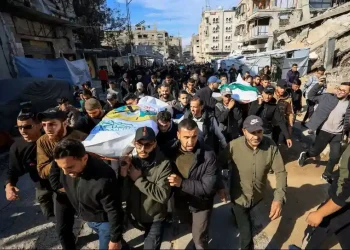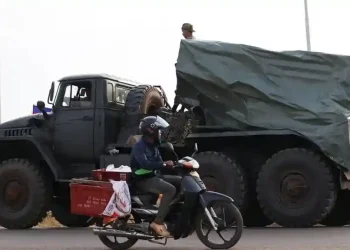Indian and Pakistani Troops Exchange Intense Fire Across Kashmir Border
At Least Five Civilians Killed as Tensions Escalate
SRINAGAR, India – The already volatile Kashmir region has seen a sharp escalation in tensions as Indian and Pakistani forces exchanged intense artillery fire overnight, killing at least five civilians in the process. The heavy bombardment, which began after a deadly attack on tourists in India-controlled Kashmir, has fueled fears of a larger conflict between the nuclear-armed neighbors.
In Pakistan, four civilians were killed and 12 more were injured in the fierce artillery exchanges near the Line of Control (LoC), the de facto border dividing the disputed Kashmir region. Local police official Adeel Ahmad confirmed the casualties, with residents describing the bombardment as the heaviest they’ve seen in years. “We’re used to hearing gunfire across the border, but last night was different,” said Mohammad Shakil, a resident of the Chakothi sector in Pakistan-administered Kashmir.
Civilian Casualties on Both Sides
On the Indian side, military officials reported that Pakistani troops launched a barrage of artillery and mortars targeting Indian posts in the Uri and Poonch sectors. The overnight exchange left two civilians dead and four others wounded, bringing the civilian death toll in India-controlled Kashmir to 18 since Wednesday. Pakistan has reported 17 civilian deaths in the same period from Indian fire across the border.
Authorities on both sides have evacuated thousands of civilians from vulnerable border towns. Many are now sheltering in makeshift camps, as the border conflict shows no signs of slowing down.
Rising Tensions and Allegations
The deadly exchanges come amid growing tensions between India and Pakistan. The conflict erupted after a deadly attack on Indian tourists in Kashmir on April 22, in which 26 people, mostly Hindu pilgrims, lost their lives. India has blamed Pakistan for supporting the attack, a claim Islamabad denies. In retaliation, India launched airstrikes on Pakistani targets it described as militant strongholds, leading to civilian casualties on both sides.
This Wednesday, Indian forces reported shooting down five Pakistani fighter jets, while Pakistan claimed to have successfully thwarted drone and missile attacks targeting military installations across Indian-controlled Kashmir. These developments have been marked by claims and counterclaims, making independent verification difficult.
Drone Warfare Escalates the Conflict
On Friday, India announced that Pakistani forces had launched a series of 300-400 drones into Indian airspace, targeting military sites along the western border. Wing Commander Vyomika Singh of the Indian Air Force confirmed that India had successfully downed several drones using both kinetic and non-kinetic methods.
Social Media Blocked and Censorship Concerns
Meanwhile, India has intensified efforts to control the flow of information, with reports that the Indian government ordered the social platform X (formerly Twitter) to block over 8,000 accounts, including those of international news outlets. X criticized the move as an infringement on free speech, with some accounts temporarily inaccessible.
Economic and Social Impact of the Crisis
As military tensions rise, the crisis has begun to disrupt daily life. India’s flagship domestic cricket competition, the Indian Premier League (IPL), was suspended for a week due to the escalating conflict. Pakistan moved its own cricket tournament to the UAE as a precaution.
In northern India, panic spread during a cricket match in Dharamsala, where over 10,000 spectators were evacuated as the match was abruptly called off. Schools across the affected regions, including Punjab and Rajasthan, were also closed for two days as a safety measure.
Meanwhile, several airports in northern and western India suspended operations, affecting both domestic and international travel. India’s stock market reflected the growing uncertainty, with the Sensex plunging 662 points and Nifty 50 dropping by 215 points.
Global Concerns and U.S. Response
As the situation worsens, world leaders are urging both India and Pakistan to de-escalate. However, U.S. Vice President JD Vance stated that while the U.S. will encourage dialogue, a potential war between India and Pakistan would be “none of our business.” In an interview with Fox News, Vance emphasized that the U.S. would not get involved in the conflict, stating, “It has nothing to do with America’s ability to control it.”
As tensions continue to mount, the international community watches closely, hoping that both countries will find a way to avoid further escalation and the potential for war.
This article was rewritten by JournosNews.com based on verified reporting from trusted sources. The content has been independently reviewed, fact-checked, and edited for accuracy, neutrality, tone, and global readability in accordance with Google News and AdSense standards.
All opinions, quotes, or statements from contributors, experts, or sourced organizations do not necessarily reflect the views of JournosNews.com. JournosNews.com maintains full editorial independence from any external funders, sponsors, or organizations.
Stay informed with JournosNews.com — your trusted source for verified global reporting and in-depth analysis. Follow us on Google News, BlueSky, and X for real-time updates.














